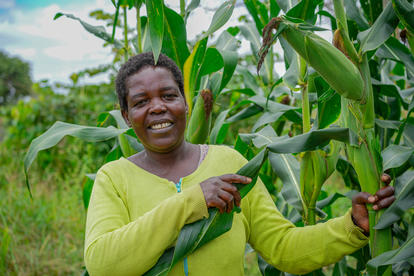By Isaac Atunlute
Nigeria’s rural farmers have, for decades, been at the mercy of middlemen, who slash the farmers’ incomes in exchange for market access or credit.
A digital platform called the Sovereign AgroTrade System, or SAS, aims to curb the exploitation by connecting farmers to not just buyers but also to global markets.
The initiative is the outcome of a collaboration between the federal government and the Nigerian Women for Agricultural Progressive and Development Initiative.
SAS condenses trading and management into four components.
For instance, the platform provides a marketplace for farmers to sell directly to consumers, without an intermediary.
Next to its microloans and savings facilities, the platform guarantees certification to track product quality using data collected from farmers.
The Minister of State for Agriculture and Food Security, Aliyu Abdullahi, has hailed the platform as a formidable step towards self-reliance. “This is not just about agriculture; it is about food sovereignty, financial sovereignty, and technological sovereignty,” he said.
The platform is in itself borne out of real-life experience. Omolara Svensson, the national coordinator, recalls being restricted from major markets and not having secure ways to make payments, leading her to sell her farm goods at lower costs.
Apart from market access, SAS also addresses two critical challenges: finance and certification.
Access to savings and microloans enables farmers to invest in inputs such as fertilisers, irrigation sets, or seeds, resources that directly influence yields.
Meanwhile, product traceability and quality verification can open doors to higher-paying export markets, where buyers require proof of origin and production standards.
By making these tools available nationwide, the initiative hopes to reduce rural poverty and strengthen food security.
Organisers say SAS is now accessible in all 774 local government areas, and they are encouraging cooperatives, community-based organisations, and institutions to adopt it as part of their agricultural strategies.
With direct connection to bulk purchasers and retailers, farmers benefit from selling promptly and in bulk quantities, thereby saving money and making profits.
The platform is also being promoted as youth preservation in agriculture; several Nigerian youths abandon agriculture as they regard it as a low-paying, high-labour, and unremitting business.
A digital solution like SAS could turn the tide as it would make agriculture resemble other tech-enabled businesses, with clear data, direct payments, and growth potential.
While Nigeria struggles with rising food prices, reliance on imports, and the pressure of an expanding population, initiatives such as SAS provide a glimpse of what technology can do for the agricultural economy.
Whether it succeeds will depend on how quickly the farmers accept the system, how much it can be integrated into supply chains that already exist, and how much institutional support can be mobilized.
Nigeria's rural farmers have long been exploited by middlemen for market access and credit, reducing their income. The Sovereign AgroTrade System (SAS), a digital platform created by the federal government in partnership with the Nigerian Women for Agricultural Progressive and Development Initiative, seeks to change this by providing direct access to consumers and global markets. SAS integrates trading and management through a marketplace, microloans, savings, and product quality certification, aiming to enhance self-reliance in agriculture.
Endorsed by the Minister of State for Agriculture, the platform also addresses finance and certification challenges, enabling investments in farming inputs and facilitating access to higher-paying export markets. It is operational in all 774 local government areas, encouraging local adoption. SAS is particularly significant for the youth, revitalizing the image of agriculture with technology, data, and direct payments.
As Nigeria faces rising food prices and import dependency, SAS offers a technological solution for agricultural transformation. Its success will depend on farmer acceptance, integration with existing supply chains, and institutional support.






